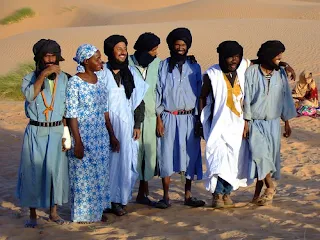White Moors and Black Moors of Mauritania
Defining Moorish Bidan or White Moors and Haratin or Black Moors Identity and Diversity.
The term Moor originated from the Greek word Mauros or Maouris, which referred to dark-skinned people or inhabitants of North Africa. Over centuries, it became a broad and somewhat imprecise label for the various peoples living in North Africa, including Berbers and Arabs.
In the Republic of Mauritania, most people are called Moors. They come from a mix of Arab and Berber backgrounds. But something important to know is that they, like most of the world, make distinctions based on the color of their skin while looking at things like family and where they come from to categorize themselves.
Because of this, two main groups have formed over time: the Bidan, who are sometimes called the White Moors, and the Haratin, who are known as the Black Moors. These groups have different histories and cultures, as well as the color of their skin.
Social descent and skin color have historically shaped the Moorish population. Bidan, White Moors, and Haratin, or Black Moors are the two main groups.
The Republic of Mauritania, a vast country in North West Africa comparable in size to France and Spain combined, boasts a diverse population of approximately 4.5 million people, with 66% being of Morrish descent. Most of its inhabitants are Moors, a diverse group of Arab-Berber descent who speak Hassaniya dialects.
Social descent and skin color have historically shaped distinctions within the Moorish population. This division has given rise to two significant groups: the Bidan, often referred to as the White Moors, and the Haratin, known as the Black Moors.
The terms Bidan and Haratin are historically significant when discussing the social and ethnic dynamics in Mauritania and parts of North West Africa. These terms are often associated with the Moors, a group of North African people. Both Bidan and Haratin Moors have distinct cultural practices, languages, and traditions.
Bidan or White Moors
The Bidan, also known as the White Moors or Arab-Berber Moors, are traditionally the lighter-skinned, Arabized Berber populations of Mauritania and other North West African regions.
The Bidan Moors are heavily influenced by Arab and Berber cultures due to their historical ties to Arab and Berber migrants who settled in the region.
Arabic is the primary language the Bidan Moors speak, and Islamic traditions play a significant role in their culture.
Bidan Moors have historically held positions of power and influence in Mauritania, including in politics, business, and social structures.
Music and dance are important cultural expressions for the Bidan Moors. Traditional instruments like the stringed tidinit and the wind instrument called mizmar are commonly used in their music.
Islam plays a central role in the lives of the Bidan people, shaping their religious practices, culture, and way of life.
Haratin or Black Moors
The Haratin, often referred to as the Black Moors, are a group primarily composed of darker-skinned individuals who are descendants of African ethnic groups.
They have a long history of living in the same regions as the Bidan Moors, including Mauritania and other parts of North West Africa.
The Haratin Moors have deeper African roots and are often descended from ethnic groups native to the region, such as the Soninke, Wolof, and Fulani.
As a result, they exhibit a blend of African and Arab-Berber cultural elements. Haratin communities speak many languages, including Arabic and native African languages.
Unlike the nomadic lifestyle of some Bidan Moors, many Haratin communities have historically engaged in agriculture, cultivating crops like millet, sorghum, and rice.
Farming practices and agricultural festivals are integral to their cultural identity. Historically, the Haratin have often occupied lower social and economic positions; some have been engaged in agricultural or labor-intensive work.
Islam plays a central role in the lives of Haratin Moors, as it does for Bidan Moors. They observe Islamic traditions, including prayer and fasting during Ramadan.









